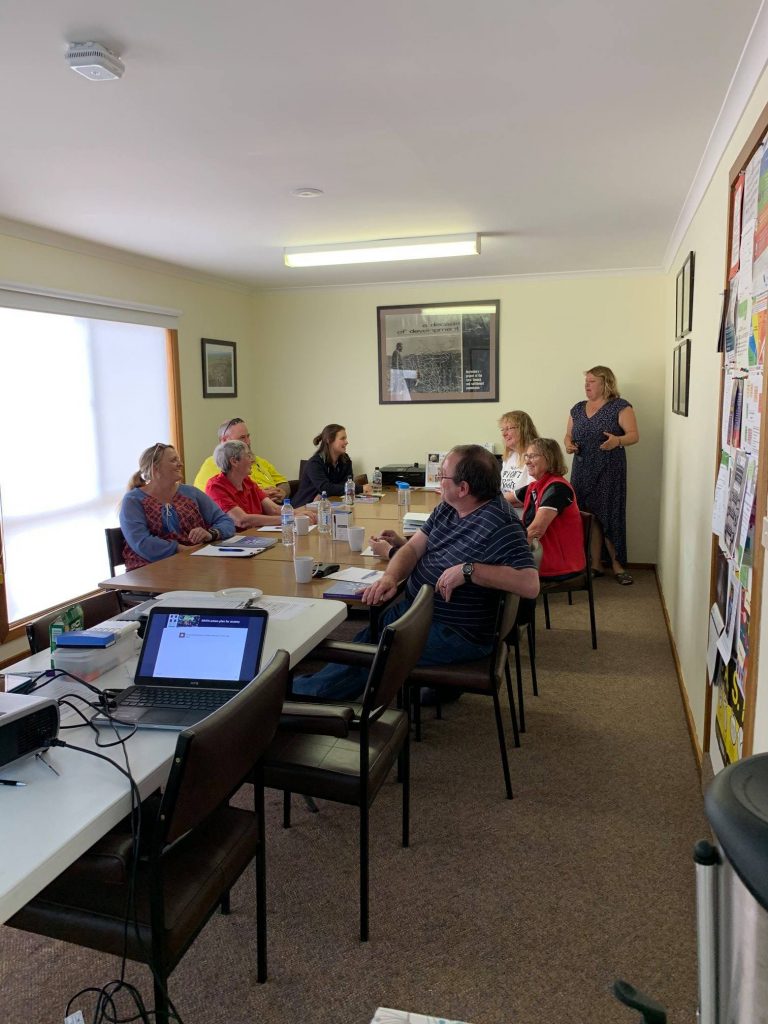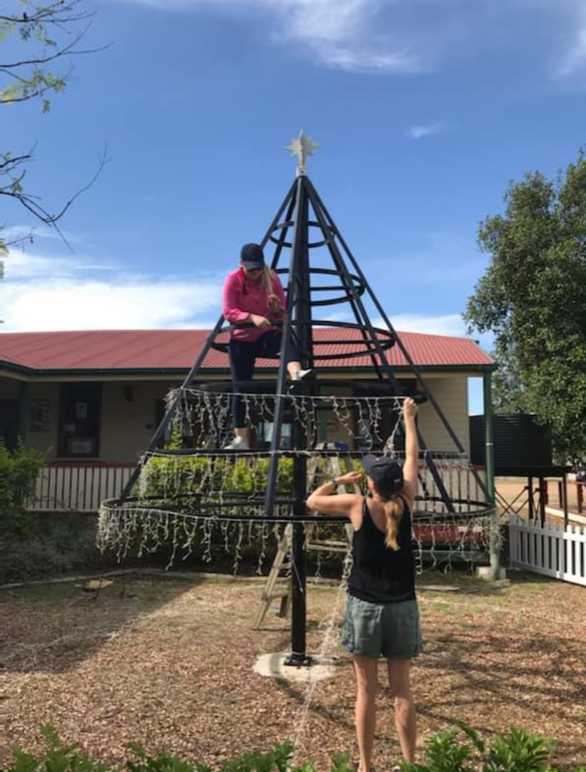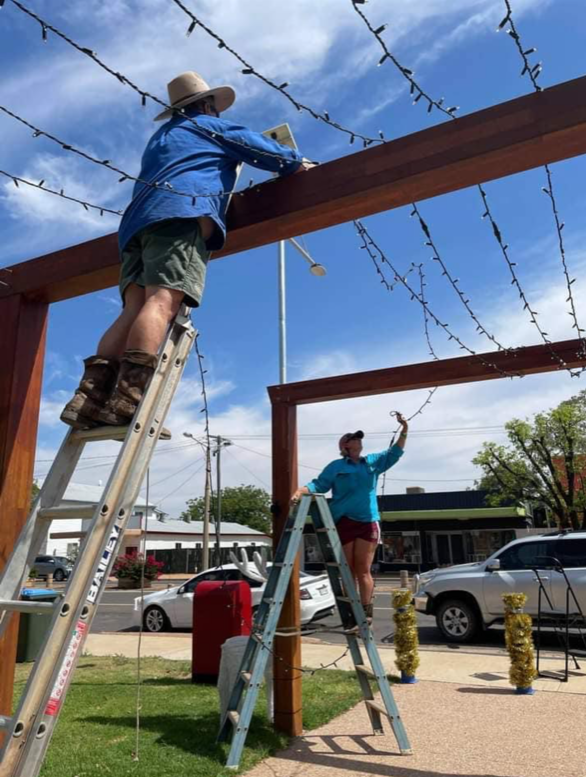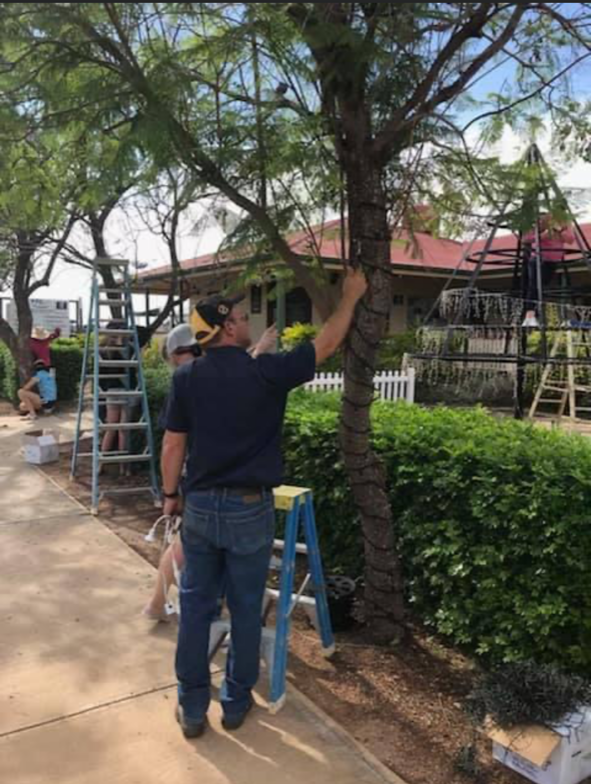Foundation for Rural & Regional Renewal (FRRR)
Nutrien Ag Solutions partnered with the Foundation for Rural & Regional Renewal (FRRR) to invest in meaningful community projects across Australia.
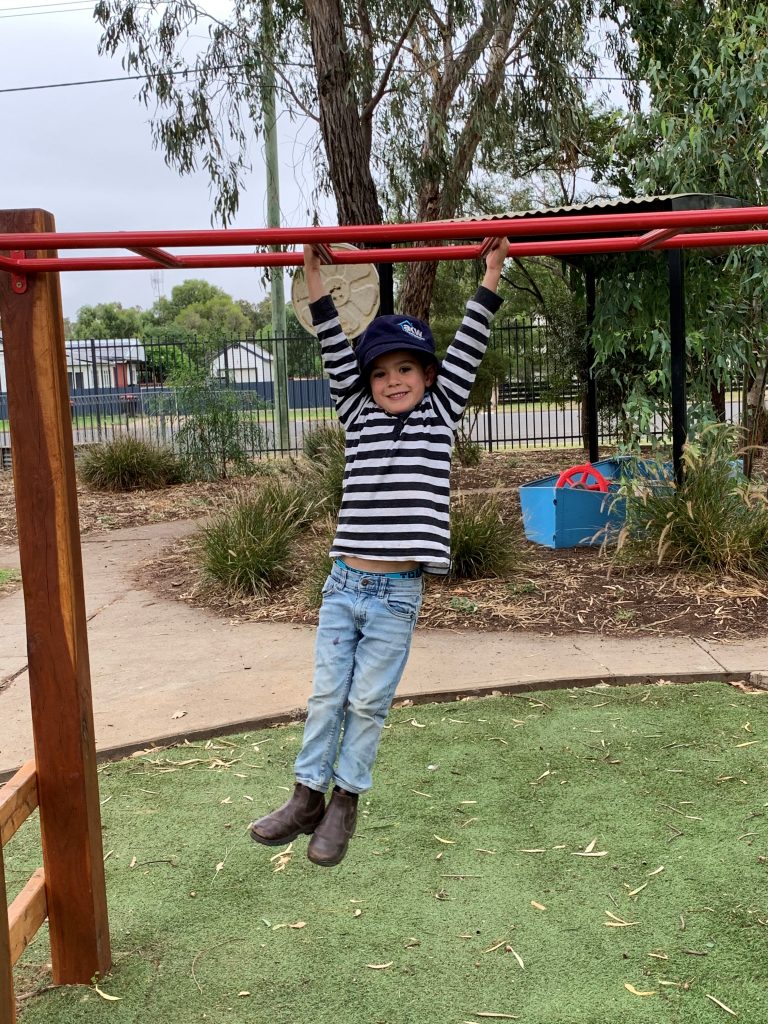
In the first round of the Nutrien Ag Solutions Community Grants Program, one recipient was Coonamble Pre School Association.
The pre-school funds and provides an occupational therapy program for local children, which involves tailored physical education programs that aim to develop motor skills critical to school readiness.
The grant was used to purchase a set of monkey bars to be utilised as part of the occupational therapy program with the aim to build children’s shoulder stability, balance, core strength and develop gross motor skills.
Speaking on behalf of the pre-school, Coonamble Pre-School President Jess Lovel described the monkey bars as being a “valued contribution to our occupational therapy program”, playing a “key role in our children’s overall development”.
“The children have been learning to swing forward and backwards, hold and swing while they tuck their legs up and propel themselves forward thus improving their hand eye coordination, building their core, leg, arm and spinal strength and improving their overall health, well-being and posture,” she said.
Cinema goers at the Mansfield Armchair Cinema can now enjoy outdoor movie nights thanks to newly installed weatherproof speakers funded by the Nutrien Ag Solutions Community Grants program.
The Mansfield Armchair Cinema is an award-winning community cinema that hosts local events and supports the delivery of an innovative media studies traineeship program for secondary and TAFE students from the Mansfield and Goulburn areas.
Nutrien Ag Solutions Mansfield Livestock Manager, Jamie Beckingsale, says his team is very proud to support such an important community organisation.

“The Mansfield Armchair Cinema is the hub of our regional community, and its volunteers give so much to our local community. So, it’s really important we do what we can to support its longevity and success,” said Mr Beckingsale.
Mansfield Armchair Cinemas’ Karen Oliver saidlocals are already making the most of the new outdoor speakers.
“Before we received the community grant, we had to carry the speakers out every time to the village green for people to enjoy the movies. Now we have permanent outdoor sounds which is just a blessing. The movies really sound great,” says Ms Oliver.
“We’ve been able to hold some fun movie nights including an 80’s themed night recently and we have a screening of Top Gun coming up, ready for the new movie to come out. The process of applying for a community grant was very straightforward, and we thank Nutrien Ag Solutions for this opportunity.”
The next round of the Nutrien Ag Solutions Community Grants program opens on the 12 of July 2022.
The Penneshaw Community Health Rooms once housed Medical, Community Nursing and Allied Health Services on a weekly basis. With budget restraints by SA Health, these services were discontinued in Penneshaw and centralised in Kingscote, meaning a round trip of approximately 120 km for local residents needing to access services.
Over a number of years, the Penneshaw CWA had advocated the need for the provision of a doctor for the Penneshaw area, liaising with the Kangaroo Island Medical Clinic, Rural Doctors Association of South Australia, Kangaroo Island Health Service, and Kangaroo Island Council. In 2021, the CWA was able to secure the services of a General Practitioner who began consulting one day a week in September 2021.
The Penneshaw CWA, Penneshaw Progress Association (PPA) and Community Volunteers have worked to clean, paint and refurbish the building so that services can be reinstated.
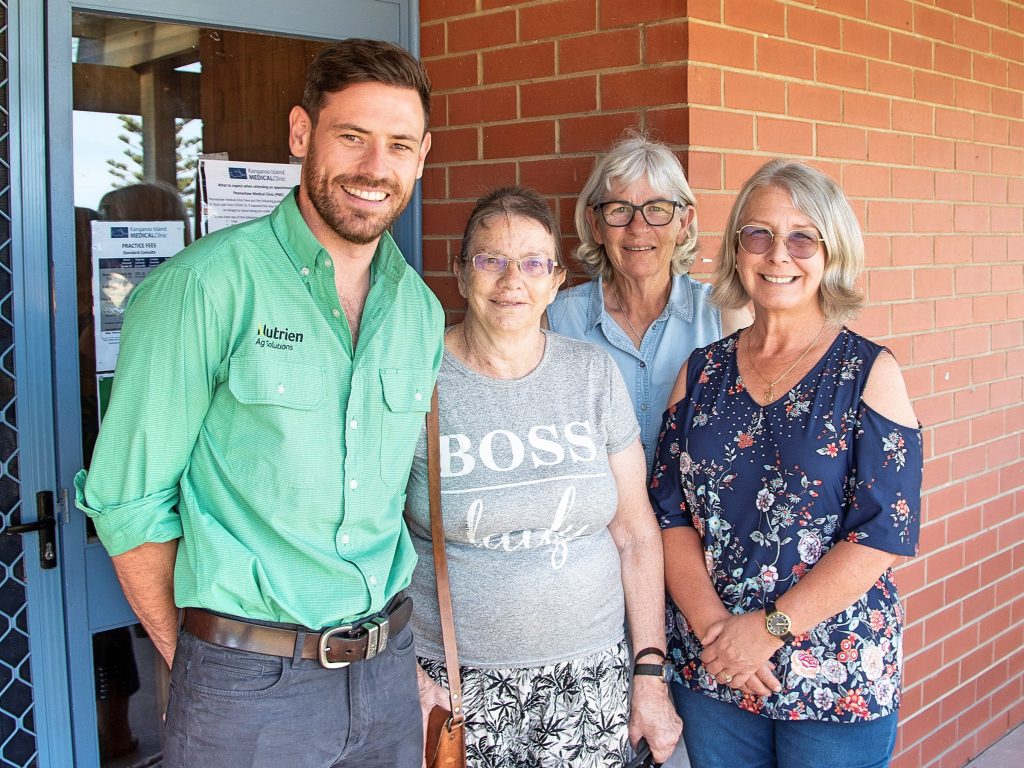
The Penneshaw CWA, with the support of the Penneshaw Progress Association (PPA), was successful in their application for a $5,000 grant through the Nutrien Ag Solutions Community Grants program, with a further $1,000 generously donated by the Penneshaw CFS in support of the facilities. The grant money was used to provide air-conditioning for the clinic’s consulting room and to provide disability access to the toilet, with a high-rise mobility toilet and grab rails. These improvements now meet the standards and guidelines required by the Commonwealth Disability Access Legislation, and provide comfort for the diverse number of users of the clinic.
Applications are now open for ANZ’s Seeds of Renewal program, with grants of up to $15,000 available for not-for-profit organisations in remote, rural and regional areas to support the ongoing prosperity of regional Australia.
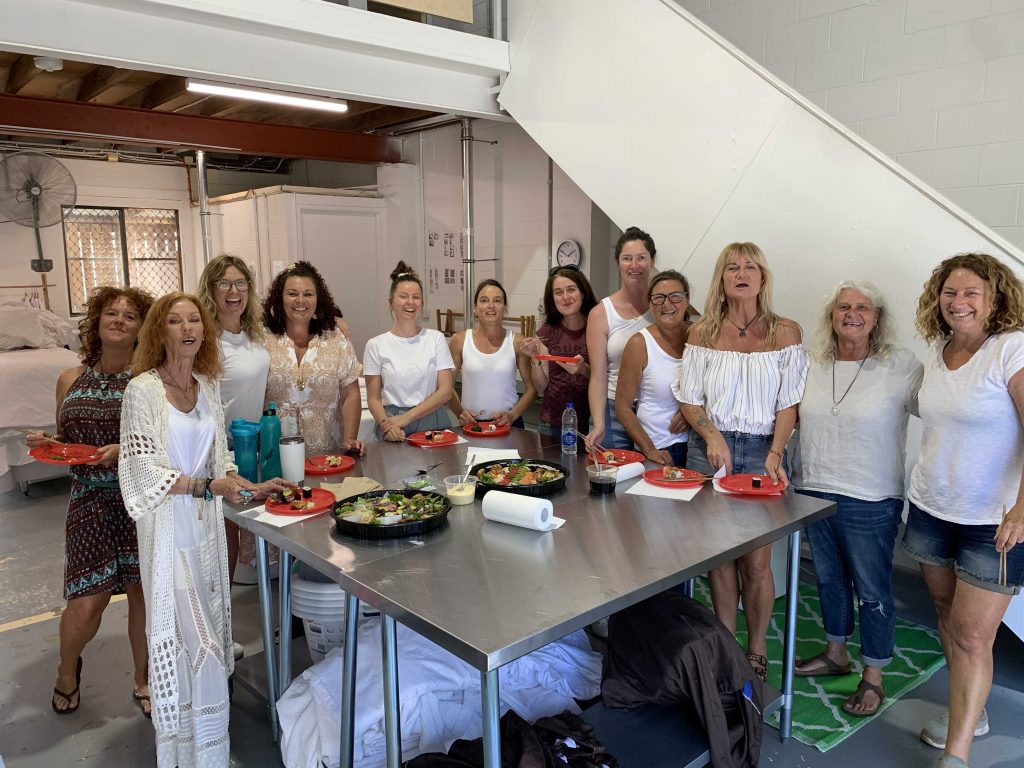
Celebrating 20 years in 2022, the program is administered by the Foundation for Rural & Regional Renewal (FRRR) and has provided more than $5 million to more than 800 community groups to help build vibrant and sustainable communities.
This year, the ANZ Seeds of Renewal program is offering a share of $250,000 to community organisations in remote, rural or regional locations for projects aligned to four focus areas:
- Environmental sustainability: initiatives that restore and conserve the natural environment or which contribute to lower carbon emissions, water stewardship and waste minimisation;
- Financial wellbeing: particularly for under-represented and disadvantaged people in the community, including initiatives that improve economic participation. For example, building financial literacy and vocational skills and providing access to meaningful work;
- Housing access: initiatives and programs that support those experiencing or at risk of homelessness or that provide supports for people living with disability; or
- Projects that assist local communities to thrive.
ANZ Head of Agribusiness Mark Bennett said: “Now in its twentieth year, the ANZ Seeds of Renewal program has provided hundreds of groups in regional and rural Australia with funds to deliver projects to help their communities thrive. We are incredibly proud of the partnership and the contribution it has made to regional Australia,” Mr Bennett said.
FRRR CEO Natalie Egleton said: “It’s been a particularly tough year for many rural communities, with the impacts of COVID on top of fires, floods and drought. Programs like ANZ Seeds of Renewal offer funding to help the local groups that are the backbone of their communities address local needs, issues and opportunities in a way that will help create stronger places to live and work.,” Ms Egleton said.
Last year, ANZ and FRRR provided grants to 21 community groups for projects including: upgrading a facility that improves financial outcomes for indigenous women and girls in Port Lincoln; improving community meeting space for people with a disability in Atherton; and educating students in Coffs Harbour on career opportunities in bee propagation and environmental sustainability.
Applications open on 5 July and close 5pm AEST, 3 August 2022.
A grantseeker workshop will be held online from 1 – 2pm AEST, 14 July 2022.
For more information about ANZ Seeds of Renewal, to apply for a grant or to register for the webinar, please visit FRRR’s website.
A rural NSW grantseeker is proving that philanthropic investment in people and skills can produce a huge return on investment – bringing in more than $2.4million in grants for his community.
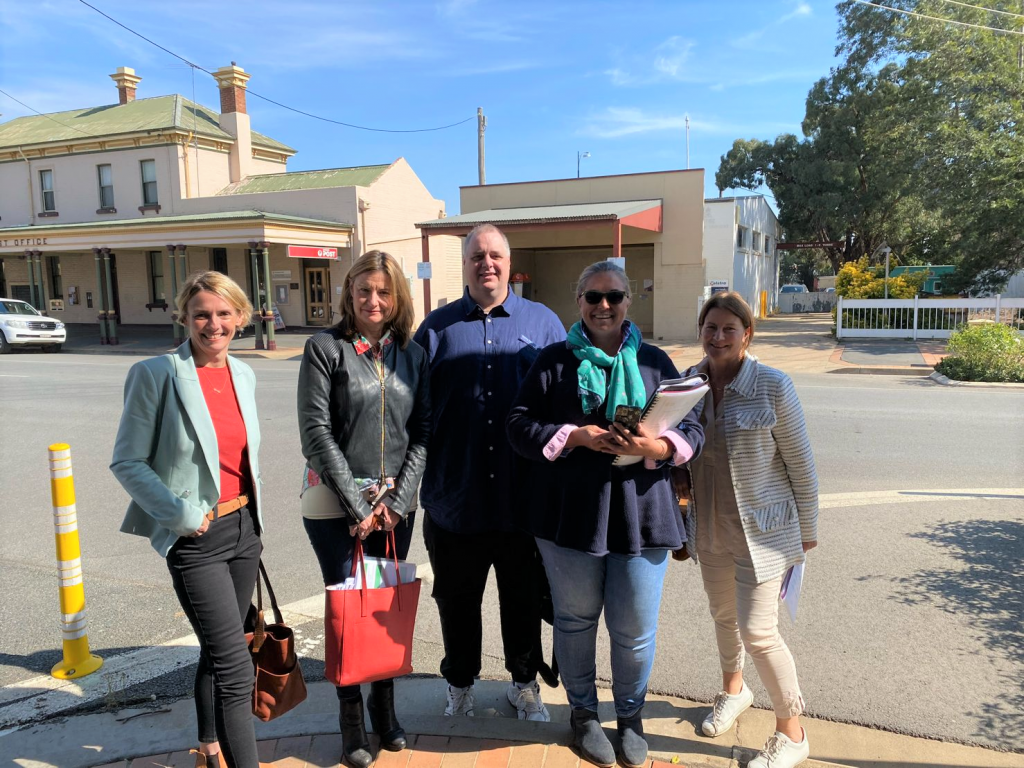
While many Government and philanthropic funders won’t give grants for funding people or capacity building, Junee Business and Trades Community Liaison Officer Nicholas Pyers is showing such investments can pay large dividends.
Nicholas’s role has been funded since 2019 by The Foundation for Rural & Regional Renewal (FRRR)’s Investing in Rural Community Futures program. He has been successful in helping win and advise on grants totalling $2,483,226 – and is awaiting news on a further $1million of grants that are in progress for Junee, which is located 440km south-west of Sydney in the Riverina region.
FRRR CEO Natalie Egleton said that since late 2018, regional NSW communities have faced a series of unrelenting disruptions, with drought, bushfire, flood and the COVID-19 pandemic continuing into 2022.
“The impact on these NFP organisations has been significant. It has taken its toll on the people that lead and run these organisations and has increased their load and affected their wellbeing. The sector has been dealing with extreme fatigue, burnout, limited fundraising options, access to volunteers, disconnection and, in some instances wholesale organisational change.
“The funding of Nicholas and the grant support role is a great example of how investing in local jobs and paying someone who has skills can result in high-yielding results and impact for organisations and communities,” she said. “This gives weight to our practise of employing local people and leveraging their position to help build the capacity of the entire town or community,” Ms Egleton said.
The impressive tally has been reached by a combination of activities. The grants have been won either by Nicholas directly developing a project concept and budget, then writing and submitting the grant application, or him reviewing other grant applications that have been submitted, as well as him identifying grant opportunities for other groups so they are able to apply. Nicholas also provides support to individuals in organisations, building their capacity and knowledge of grant writing, which allows them to prepare and submit grants, and secure funding for their own organisations.
FRRR’s Investing in Rural Community Futures (IRCF) model was developed in partnership with Vincent Fairfax Family Foundation (VFFF) and aims to strengthen local not-for-profit (NFP) organisations and, ultimately, enable them to thrive. It is a grassroots approach designed to build and support the capacity of individual and collective NFPs, over a sustained period of time.
This program now operates in seven communities in NSW, delivering a blend of grants and capacity building activities supported by local facilitators. Junee, Leeton and the Nambucca Valley were the initial cohort of communities supported by the Vincent Fairfax Family Foundation. Supported by The Snow Foundation Nowra, Ulladulla & Batemans Bay started an IRCF program in 2020 and further investment by Bendigo and Adelaide Bank’s Community Enterprise Foundation saw Bay & Basin communities join in 2021.
Successful grants for the Junee community range from upgrades to sporting facilities and meeting rooms through to projects supporting the likes of a museum.
Thirty-four local groups and not-for-profits that delivered food and care hampers to regional communities during the height of the 2021 COVID-19 restrictions will share in $300,000 from the NSW Government’s COVID Regional Community Support (CRCS) program.

Minister for Emergency Services and Resilience and Minister for Flood Recovery Steph Cooke said more than 72,000 hampers were delivered to residents in regional and rural parts of NSW, including Ballina, Tweed Heads, Leeton and Albury.
“These groups and organisations dropped everything and dipped into their own funds to support isolated residents during last year’s COVID-19 restrictions by partnering with Resilience NSW to prepare and deliver food, essential items and relief packs to those in need,” Ms Cooke said.
“The $300,000 will cover expenses like fuel, couriers, and logistics costs, helping these groups and organisations to continue their wonderful work into the future, including at the Ballina Hot Meal Centre which is using its $5,024 grant to purchase new freezers.”
Each grant being provided through the CRCS program ranges from $1,000 to $30,000 and is administered by the Foundation for Rural & Regional Renewal.
Foundation for Rural & Regional Renewal CEO Natalie Egleton said the funding recognises the critical role that local community groups played during the pandemic.
“We’re delighted that 23 per cent of applications are from Indigenous community groups, all of which played such a vital role in ensuring that their community members were cared for, and we are pleased to be able to support them with this funding,” Ms Egleton said.
Applications are currently being accepted for grants of up to $50,000 for capacity building initiatives, such as attracting and retaining volunteers and staff, enhancing governance skills, building digital capacity and creating partnerships that foster stronger, more resilient communities.
See the full list of recipients below:
| Organisation | Locations | Grant |
|---|---|---|
| Agape Outreach Incorporated | Tweed Heads - Byron Bay | $1,681 |
| Albury Wodonga Regional Foodshare | Albury | $13,500 |
| Allambi Care Limited | Lake Maquarie - Warners Bay - Central Coast - Cessnock - Newcastle | $7,000 |
| Armidale / Uralla Meals On Wheels Incorporated | Armidale | $3,183 |
| Ballina Hot Meal Centre Incorporated | Ballina | $5,024 |
| Belong Blue Mountains Incorporated | Blue Mountains | $1,000 |
| Camden Haven Community at 3 | Lakewood | $1,125 |
| CatholicCare Social Services Hunter-Manning | Newcastle - Tareer - Forster - Maitland | $1,977 |
| Christian Outreach Centre | Kempsey - South West Rocks - Macksville - Nambucca Heads | $1,350 |
| Community Resources Limited | Wollongong | $3,540 |
| Coonamble Neighbourhood Centre | Coomamble - Gulargambone - Quambone | $10,810 |
| Food For Life Community Care Incorporated | Shoalhaven - Primbee - Wollongong - Kiama | $13,500 |
| Galambila Aboriginal Corporation | Nambucca Heads - Coffs Harbour - Woolgoolga - Bowraville | $30,000 |
| Gloucester Worimi First Peoples Aboriginal Corporation | Gloucester | $1,000 |
| Gunnedah Meals on Wheels Association | Gunnedah | $5,514 |
| Indigenous Futures Foundation Limited | Tweed Heads South - Lismore - Ballina - Grafton | $30,000 |
| Ivanhoe Central School | Ivanhoe - Balranald - Carrathool | $6,100 |
| Katungul Aboriginal Corporation Regional Health And Community Services | Batemans Bay - Narooma - Bega - Catalina - Dalmeny | $30,000 |
| Kempsey Neighbourhood Centre Inc | Kempsey | $4,500 |
| Leeton Community Care Development Incorporated | Leeton | $13,500 |
| Lions Club Of Raymond Terrace Incorporated | Raymond Terrace | $1,420 |
| Livefree Project Incorporated | Newcastle | $13,500 |
| Miyay Birray Youth Service Incorporated | Moree - Mungindi - Garah - Boomi | $18,345 |
| Moree Sports Health Arts And Education Academy Aboriginal Corporation | Moree | $5,723 |
| Orana Support Service Incorporated | Dubbo - Wellington - Narromine | $21,000 |
| Oxley Community Transport Service Incorporated | West Tamworth | $4,500 |
| Queer Family Incorporated | Mullumbimby - Byron Bay - Lismore - Kyogle | $2,250 |
| Salt Care | Ulladulla - Bomaderry - Nowra - Kangaroo Valley - Jervis Bay | $20,460 |
| Sapphire Community Projects Incorporated | Bega - Tura Beach - Bermagui - Candelo - Quaama | $4,703 |
| Seventh-Day Adventist Church - South New South Wales Conference | Bathurst - Blayney - Mandurama - Cowra | $5,600 |
| The Heartland Foundation Limited | Port Macquarie | $5,000 |
| The Mend AND Make Do Crew Incorporated | South Grafton | $6,750 |
| Uralla Neighbourhood Day Care Centre 1 | Walcha | $4,860 |
| Weilwan Local Aboriginal Land Council | Gulargambone | $1,585 |
Four local NFPs awarded grants
In partnership with the Bendigo Bank Community Enterprise Foundation, FRRR has awarded a further $50,293 to support four not-for-profit organisations (NFPs) in the Bay & Basin area. Bay & Basin NFPs have now received nearly $150,000 to date through the Investing in Rural Community Futures (IRCF) program, which is helping to address locally-identified priorities.
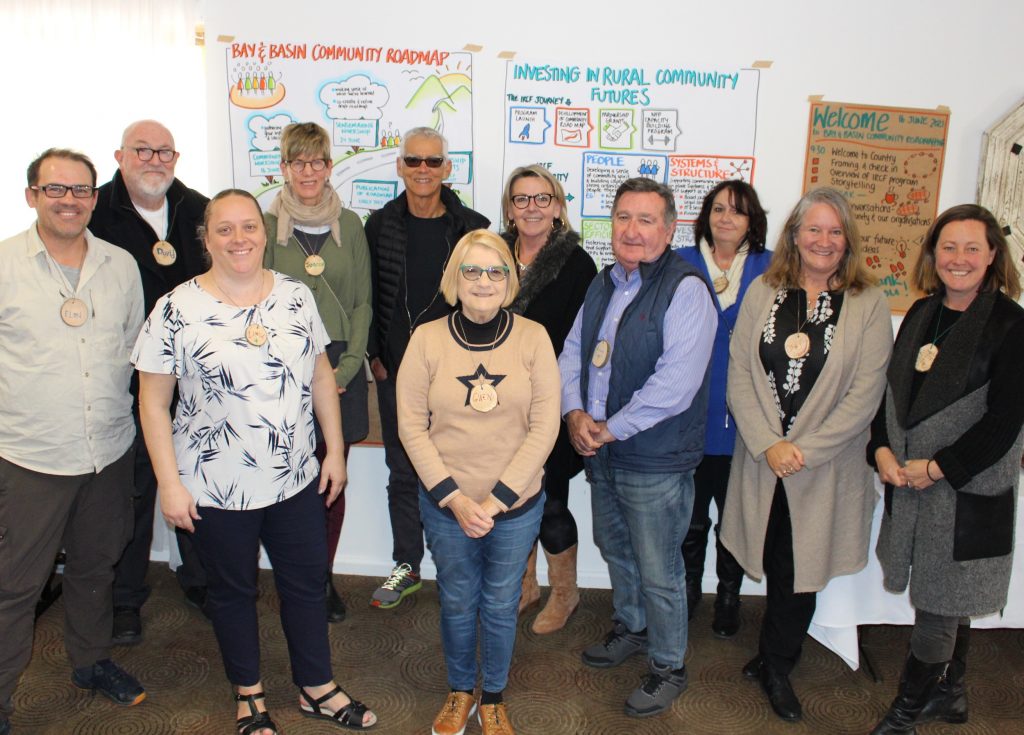
The IRCF program is a multi-year program designed to foster collaboration between local NFPs and strengthen their capacity, so they can continue to have a positive impact on the vibrancy and wellbeing of their communities. The program operates across the South Coast region, and in three other locations across NSW.
As part of the IRCF program, local leaders participated in community meetings and created a roadmap of the future opportunities they envision for their communities. This helped to identify the areas where the community groups and NFPs need support and ensures that the solutions being provided through the program are community-led.
The four funded projects cover various areas including strategy development, resilience training, equipment upgrades and human resources. One example is the Huskisson Op Shop who are engaging a paid Coordinator to support the Op Shop Volunteers, as well as a Business Advisor, who will help to modernise the Op Shop to support their food pantry in St Georges Basin.
Natalie Egleton, CEO of FRRR, said that multi-year programs, like IRCF, are vital for these remote, rural and regional communities.
“The NFPs in Bay & Basin play a big role when it comes to the quality of life for people living in these communities. Local leaders know what will work, so our role is to support them to create locally-led solutions that can be implemented over a series of years. This ensures that these communities thrive long into the future,” Ms Egleton said.
David Impey, CEO Community Enterprise Foundation, the Bendigo and Adelaide Bank’s charitable arm, said that the grant recipients are committed to developing all aspects of their organisations.
“It’s inspiring to see these people who are willing to take such a multi-faceted approach when it comes to building resilient communities. Through this program they’re developing their skills, strengthening their relationships with their peers, improving their processes and engaging in some really productive conversations.
“These organisations are powerful advocates for their communities. We’re very thankful to be able to support their efforts in creating sustainable and long-term solutions that will see the lives of everyone in Bay & Basin made that much more vibrant,” Mr Impey said.
The four projects being funded are:
- Vincentia Ratepayers and Residents Association Inc, Vincentia – Prepare, Develop, Publish and Regularly Update the Vincentia Ratepayers and Resident Association 2030 Strategic Vision Document – $7,000
- Sussex Inlet District Chamber of Commerce Incorporated, Sussex Inlet – Sussex Inlet, a Vibrant Future- Building the capacity of our communitythrough resilience training and by developing a marketing campaign – $3,900
- Sanctuary Point Community Pride Incorporated, Sanctuary Point – Boosting Pride by fostering community engagement and enhancing organisational capacity through the development of a website, communications strategy, and accounting software – $10,309
- UCA – Bay & Basin, St Georges Basin – Growing the Husky Op-shop by building organisational capacity to enable a stable of aligned social enterprises – $29,084.
In addition to Bay & Basin, the IRCF South Coast program is also working in Nowra, Batemans Bay and Ulladulla, with the support of The Snow Foundation and in Junee, Leeton and Nambucca Valley in partnership with the Vincent Fairfax Family Foundation.
For more information about the Investing in Rural Community Futures program visit – https://frrr.org.au/ircf-program/.
And support from new IRCF Program Manager and facilitator
Seven not-for-profit organisations (NFPs) are sharing in $135,471 for projects that will strengthen the NFP sector and inter-organisational relationships in Nowra, helping the community to thrive and achieve long-term stability. Nowra NFPs will also have on-the-ground support from a new South Coast Program Manager and local facilitator.
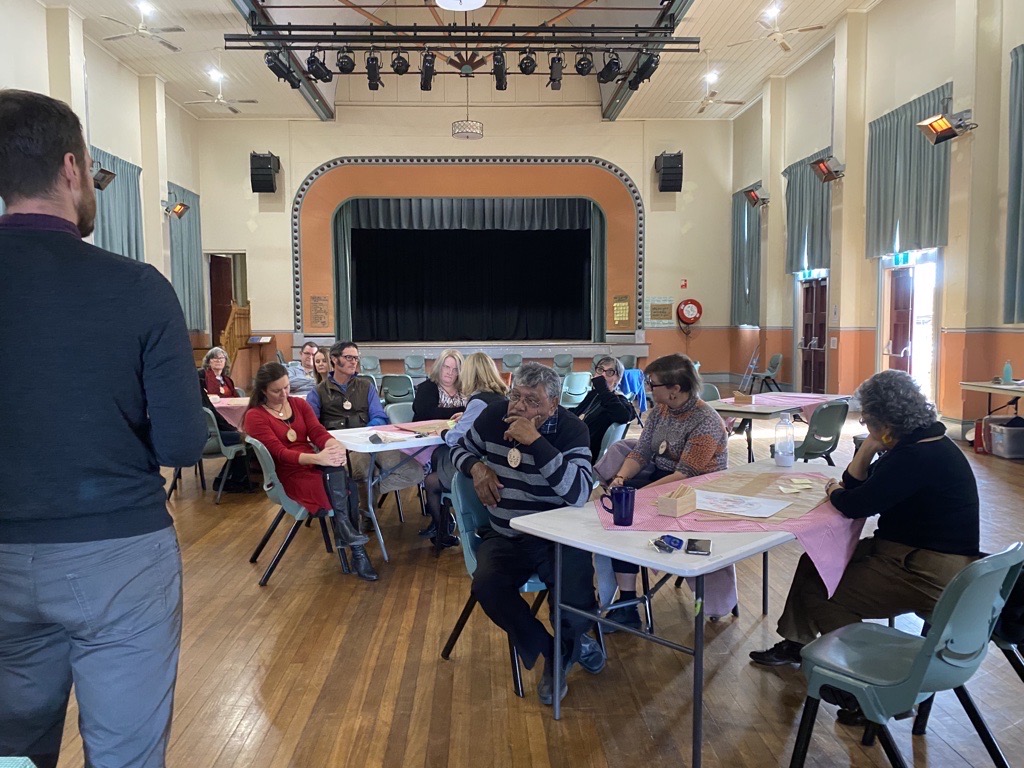
Funded through FRRR’s Investing in Rural Community Futures (IRCF) program, in partnership with The Snow Foundation, these grants will allow Nowra NFPs to properly develop the tools, resources and skills they need to achieve longevity and create permanent change in their communities.
IRCF is a multi-year grassroots program aimed at building the capacity and connectedness of NFPs in select communities in regional New South Wales. As well as grants, these recipients will receive organisational support and coordination in the form of workshops that will help them to implement more effective systems, processes and training within their organisations.
Among the seven projects funded, there is a focus on developing leadership and business skills, technological transformation, cultural immersion and community engagement. These projects address needs highlighted through a community-led Roadmap, the development of which was facilitated by FRRR.
Natalie Egleton, CEO of FRRR, said that these initiatives will have a lasting impact on the people of Nowra.
“It’s fantastic to see the not-for-profit organisations in this round of grants collaborating and learning from their peers, and successfully applying that knowledge to the unique needs and circumstances of their own communities.
“It’s wonderful to see local organisations prioritising community engagement and creating safe cultural spaces. This includes the South Coast Women’s Health & Welfare Aboriginal Corporation, which is using their funding to deliver cultural immersion sessions to 30 Nowra NFP representatives in response to vision identified in the Nowra Community Roadmap,” Ms Egleton said.
Terry Snow, Founder of The Snow Foundation, said partnering with FRRR has allowed his Foundation to have a significant impact on regional NSW areas such as Nowra.
“Having a home and running a business on the South Coast, I understand how important it is to support these not-for-profit organisations. They provide crucial support and fill gaps that help to keep these communities vibrant and self-sufficient. With the resources provided by this program, these organisations will create real change.
“A great example of this is the Nowra Community Food Store, which is using their grant to set up an E-commerce website with an option for contactless delivery, so that families in the Shoalhaven region who don’t own a car can still access fresh food.”
The five other grant recipients in the Nowra region are:
- Cullunghutti Aboriginal Child and Family Centre Aboriginal Corporation, Nowra – Laying the Foundations for the Future of Cullunghutti Aboriginal Child and Family Centre Aboriginal Corporation – Support the Centre’s future vision and rapid growth by appointing a temporary Community Centre Team Leader to support the CEO in an operational capacity. $30,000
- Nowra Sub-Branch of the Returned and Services League of Australia New South Wales Branch, Nowra – Nowra RSL Sub-Branch Upgrade Project 2021 – Accelerate digital transformation and enhance client experience through upgrades to IT equipment and furniture. $16,469
- Shoalhaven Community Preschool Inc, Nowra – The Growth Strategy Project – Strengthen the leadership capacity of the Centre during the Preschool’s relocation and expansion by providing a wage subsidy, expert consultants and professional development. $22,000
- Shoalhaven Health and Arts Inc, Bomaderry – Capacity Building for SHAA’s Future – Strengthen the capacity of SHAA to respond to community demand for their mental health, arts and events programs by paying wages for the currently volunteer-based managers. $14,112
- South Coast Beef Producers Association Inc, Nowra – Governance Training for South Coast Beef Management Committee Members – Strengthen the governance and strategic vision of South Coast Beef through the training of the management committee in governance foundations. $10,590
New IRCF Program Manager – South Coast and Nowra facilitator
Helping Nowra’s NFPs to make the most of the IRCF program is IRCF South Coast’s recently appointed Program Manager, and South Coast local, Carolyn Ardler.
Carolyn comes to FRRR and the IRCF program with extensive experience in place-based delivery to support communities to build capacity and reach their aspirations from the grassroots.
“I am excited to be working on the IRCF program as I strongly believe rural and regional communities have the solutions and strength within them to face their unique challenges. This program allows small not for profits to build their capacity and be more sustainable in the long term.” Ms Ardler said.
Carolyn steps into her new position as Kate Dezarnaulds, FRRR’s previous Program Manager for IRCF South Coast, transitions into the role of IRCF facilitator for Nowra. In this role, Kate will be able to work more directly with Nowra NFPs to connect, build relationships and work together to improve their capacity and sustainability.
In addition to Nowra, the IRCF South Coast program is also working in Batemans Bay and Ulladulla with the support of The Snow Foundation, and in Bay & Basin with the support of Bendigo Bank Community Enterprise Foundation, and in Junee, Leeton and Nambucca Valley in partnership with the Vincent Fairfax Family Foundation.
For more information about the Investing in Rural Community Futures program visit – https://frrr.org.au/ircf-program/.
The town of Dirranbandi, in southwest QLD, was suffering from a lack of Christmas cheer and the general community spirit was a bit flat, following relentless drought over many years. This was also having significant impacts on mental health.
In a bid to tackle these issues, while also putting Dirranbandi on the map for both tourists and locals, the Dirranbandi Progress Association used a $60,000 Tackling Tough Times Together grant, funded by the Australian Government to spark some joy in the township with a stunning lights installation.
With the support of Balonne Shire Council, the Dirranbandi Progress Association brought local tradespeople on board, as well as their local Arts Council, the business community and a work camp, which consisted of skilled prisoners who were being reintegrated back into society. Together, this dedicated team of people designed and fabricated a beautiful display of fairy lights that were installed and displayed throughout the main streets of their town all year round.
Alongside the permanent display, the grant funded Christmas lights, which is the main feature of an annual event attended by around 300 people. Locals from the around the community gather for a BBQ and watch the Christmas lights being turned on, while school children sing carols and everyone embraces the magic of Christmas.
Since having the lights installed and hosting these events, the local community, which was crippled by drought, has been able to congregate, reconnect and have its vibrant spirit reignited. As an added benefit, the local council committed to providing extra support and resources, not only for Dirranbandi, but for surrounding towns as a result of the project.
Mental Health training helps community get in a good place
With the effects of plunging milk prices and bushfires in South West Victoria, the community was feeling strained. Front line workers were regularly being confronted with people breaking down because they couldn’t pay their bills, afford feed for their stock or feeling financial pressure.
The Simpson & District Community Centre (SDCC) knew it was important to keep the conversation about mental health in the community open, to continue to break down the stigma associated with asking for help. So, they wanted to equip local community members with the skills to recognise mental health issues and provide resources for referrals to support services, as well as give them skills in self-care, given they were dealing with more and more people in crisis.
SDCC was established almost four decades ago to support Western Victorian dairying communities. Around 50 people a week use its facilities for meetings and activities – from craft, scrabble days, children’s activities, adult education, digital literacy, a Men’s Shed programme and more. The centre puts considerable effort into reducing social isolation and increasing health and wellbeing in the area.
The Simpson area has been supported by a Dairy Community Support Officer who works with farming community families in crisis. In three years, the social worker’s client numbers went from 9 to 98. She identified a number of mental health issues facing the community including anxiety, depression, drug and alcohol abuse and self-imposed isolation. The community has had one suicide since the beginning of the dairy crisis and wanted to do whatever was needed to prevent more.
Through the In a Good Place Program, funded by CCI Giving, FRRR was able to help fund the delivery the training. In March 2019, nine community members participated in a two-day Mental Health First Aid course. Another session ran in March 2020, with a half day refresher for the previous years’ participants.
In total, 16 members of the community were provided with the training and skills to identify and start a conversation regarding mental health. Those trained included workers from the local supermarket and Post Office, stockfeed supplier and vet group, as well as dairy farmers and volunteers from the Football Netball Club, Men’s Shed, Community Centre, Cricket Club, CFA and Landcare network. The array of participants meant that there was great community coverage, with everyone attending wearing “more than one hat” – so those new skills are going into nearly every organisation and workplace in Simpson.
Furthermore, the instructor for the First Aid program and the Dairy Community Support Officer were able to identify an opportunity to secure funding for additional training that will reach the community, regarding Mental Health in the elderly population. Transitioning off farms for older people is an area of mental health difficulty that the Support Officer sees first hand in her work in the community.
The SDCC maintains that if just one person can be supported through a crisis without a tragedy, then the program will be a success.
“Training more people in the community to recognise the signs and direct them to help or help to them can only improve the long term outcomes for our community and increase the resilience and sense of connection.
“By providing the training we are giving people the skills to take back into the community at their workplaces, homes and recreation activities. The more people who are able to recognise and respond to the signs of deteriorating mental health the stronger our community will be. These skills will be maintained for life and can be shared.”
SDCC Final Report
Congratulations to the SDCC for the great strength and support they provide and their ability to adapt to the community’s changing needs.
